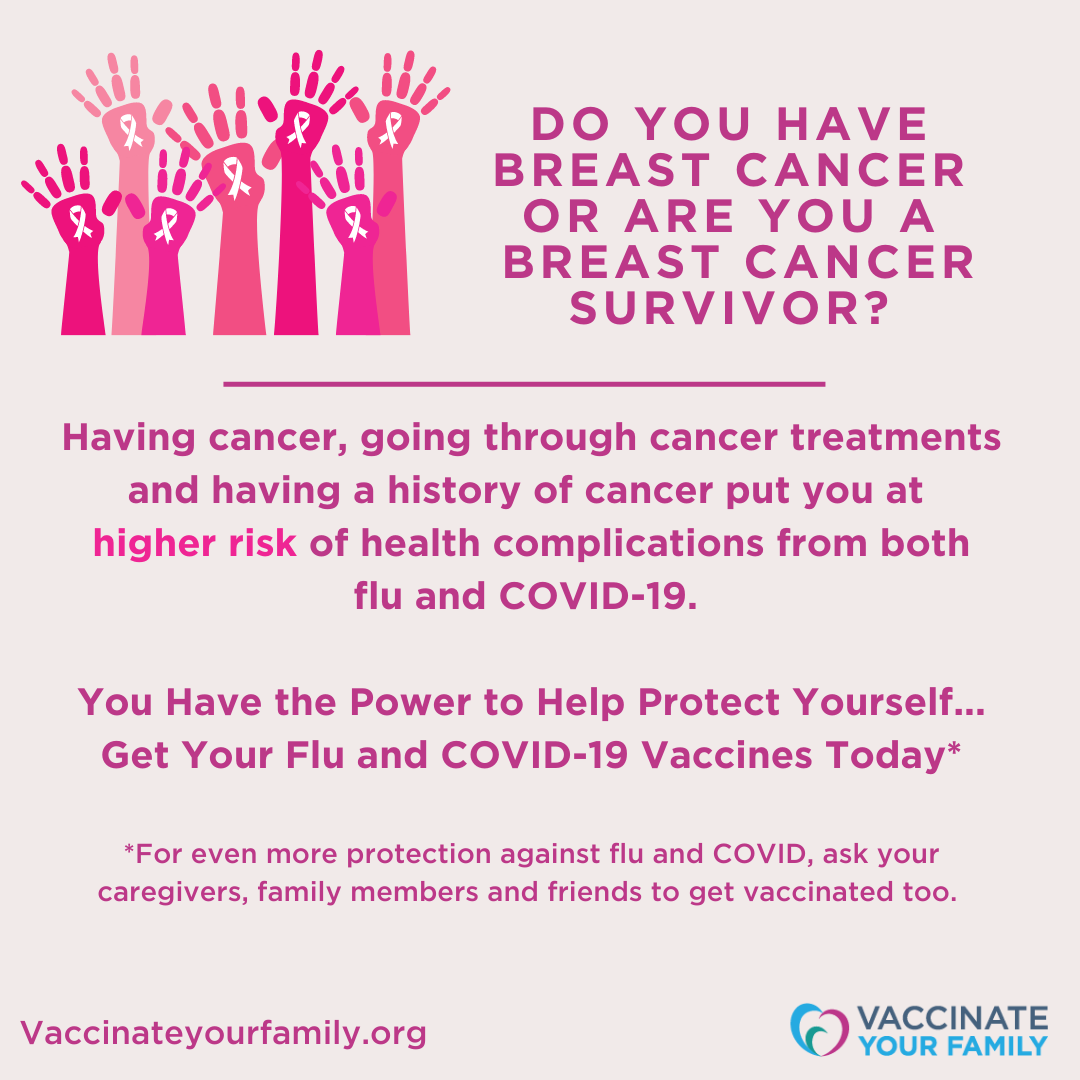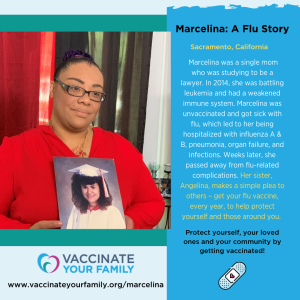2025-26 Flu Season
Flu season occurs every year in the northern hemisphere when influenza circulates (along with other respiratory viruses), beginning in the fall and peaking in the winter months. Flu vaccination is recommended for everyone 6 months and older each year – get your flu vaccine before flu begins circulating in your community for the best protection.
Flu isn’t the only thing circulating this respiratory season! Click here for more information & resources about staying well this winter.
Top 10 Flu Season Facts
1
In the U.S., flu can start to circulate as early as October, peak between December and February, and extend through May! The best time to get vaccinated is before flu begins circulating in your community.
2
It’s not “just” flu! On average every year in the U.S., flu results in millions of illnesses, hundreds of thousands of hospitalizations, and tens of thousands of deaths. Aside from COVID-19, flu is the deadliest vaccine-preventable disease in the U.S.
3
Everyone is at risk from flu, but young children, pregnant women, older adults, and people with chronic medical conditions are especially vulnerable. Read about people who have been personally impacted by flu.
4
Annual flu vaccination is recommended for everyone six months and older, with rare exception. Flu vaccines have been updated this season to help protect against three circulating strains of flu.
5
Vaccination is the best defense we have against flu-related illness, hospitalization, and death. Getting vaccinated helps protect YOU, your loved ones, and your community!
6
There is a preferential flu vaccine recommendation to better protect people aged 65 years and older. Older adults should receive a high-dose, adjuvanted, or recombinant flu vaccine.
7
A flu vaccine can’t make you sick! Check out our FAQs at the bottom of this page.
8
Flu vaccines can be given at the same time as other vaccines, including COVID-19 vaccines. And an important note: Covid vaccines DO NOT protect you against flu!
9
It’s recommended that you get a flu vaccine by the end of October and BEFORE flu starts spreading in your community, although vaccination later in the season can still be beneficial.
10
Flu vaccination can be convenient and free! Vaccines are available at doctors’ offices, pharmacies, clinics, local health departments, schools, and grocery stores. Check out to find a clinic near you and if costs are a concern, check out our Paying for Vaccines tool.


Flu Symptoms & Diagnosis
Common flu symptoms usually come on suddenly and can include:
- Fever or feeling feverish/chills (note that not everyone with flu will have a fever)
- Cough
- Sore throat
- Runny or stuffy nose
- Muscle or body aches
- Headaches
- Fatigue (tiredness)
- Vomiting and diarrhea may be common in children
Especially with flu and COVID circulating together – along with other respiratory diseases like RSV – it’s important to be properly diagnosed to determine appropriate treatment. There are a number of tests available to determine if you have the flu. Your healthcare provider may test you for flu or diagnose you based on your symptoms.
Wondering if your symptoms are flu, COVID-19, seasonal allergies, strep throat, RSV, or a common cold? Check out this comparison chart. Wondering when to seek medical attention for flu? Check out these emergency warning signs of flu in children and adults.
Flu Treatment
If you do get sick with flu, antiviral drugs – which are prescription medications – are a treatment option. These medications are most effective if taken early – within 48 hours (2 days) of getting sick. Antivirals can lessen your flu symptoms, shorten duration of illness, and help prevent severe flu illness and related complications. Antivirals are NOT a substitute for annual flu vaccination.
Prompt treatment is recommended for people who have flu or suspected flu and who are at higher risk of serious flu complications, including those 65 years and older, young children, pregnant women, and people with chronic health conditions. The CDC recommends that healthcare providers treat patients with suspected or confirmed flu as soon as possible, specifically high-risk patients and those who are hospitalized and/or experiencing severe illness.
Flu medications are most effective if taken early – within 48 hours (2 days) of getting sick.
Who is at Higher Risk from Flu?


Children
Flu can be very serious for children, especially those younger than 5 years old. Every year in the U.S.:
- Flu-related hospitalizations for young children range from 6,000 – 27,000
- Over 100 children under 18 years old lose their lives to flu
Children age 6 months and older should receive a flu vaccine every year. Flu vaccines can be lifesaving in children. Some children age 6 months through 8 years need 2 doses of flu vaccine, spaced at least 4 weeks apart. These children include those who have never received a flu vaccine or have previously only received one dose of vaccine.


Pregnant Women
Flu can cause severe illness in pregnant women due to changes in the immune system, heart, and lungs during pregnancy. Flu can also be dangerous for babies before and following birth when they’re too young to be vaccinated themselves. Pregnant women can receive a flu shot during any trimester of their pregnancy but should not receive the live attenuated flu vaccine (also known as the nasal spray vaccine). Flu vaccination is safe for pregnant people and postpartum women, even if they are breastfeeding.
Some benefits of flu vaccination in pregnant women are:


Older Adults
People 65 years and older account for 50 – 70% of flu-related hospitalizations and 70 – 85% of flu-related deaths. Older adults (seniors) are at increased risk of severe flu illness and flu-related complications due to age-related changes in their immune defenses. There is a preferential recommendation for older adults to receive a high-dose, adjuvanted, or recombinant flu vaccine because these types of flu vaccines may offer enhanced protection. People 65 years and older should also be up to date with pneumococcal vaccination.


People with Chronic Medical Conditions
People living with chronic medical conditions such as asthma, diabetes, heart disease, lung disease, and chronic kidney disease are at an increased risk of severe flu-related outcomes like hospitalization and death. During recent flu seasons, 90% of people hospitalized with flu had at least one underlying medical condition.
Some benefits of flu vaccination in people with chronic conditions are:
- Results in lower rates of cardiac events among people with heart disease
- Reduces the risk of flu-related hospitalizations in people with diabetes by 79%
- Reduces the risk of flu-related illness, hospitalization, and death in people with chronic lung disease
Stay Healthy This Flu Season
In addition to getting your recommended routine immunizations, including a yearly flu vaccine, there are some other ways you can help protect yourself and your loved ones from dangerous infectious diseases:
- Stay home if you’re sick to avoid infecting others.
- Cough or sneeze into your elbow or a tissue to avoid spreading germs onto your hands and nearby surfaces.
- Avoid touching your eyes, nose, and mouth. Germs spread this way.
- Wash your hands often with soap and water for at least 20 seconds. Use hand sanitizer if soap and water are not available.
- Clean and disinfect frequently touched objects and surfaces in your home, office, and school.
- Consider other measures like face coverings (masks) to lower your risk of exposure and transmission.
- Keep these items on hand when venturing outside of your home: a face mask, tissues, and a hand sanitizer that contains at least 60% alcohol.
Still not sure if flu vaccination is right for you and your loved ones? LEARN MORE about flu and related topics like vaccine safety and flu vaccine ingredients.
No. The way that flu vaccines are made, they cannot cause the flu. Flu shots are made from either flu viruses that have been inactivated (killed) OR with proteins from a flu virus. (In other words, only parts of the flu virus are used instead of the full virus).
Nasal spray flu vaccine is made with weakened live flu viruses, and also cannot cause the flu. The weakened viruses are cold-adapted, which means they can only cause flu infection at the cooler temperatures found in your nose. These viruses cannot infect your lungs or other warmer areas of your body.
While some people may get mild side effects from a flu shot like a sore arm, a headache, muscle aches or a low fever, those side effects usually begin soon after the shot and only last 1 -2 days. These are actually signs that the vaccine is working and your body is building immunity.
While a flu vaccine cannot give you the flu, there may be times when you don’t feel well after getting your flu vaccine. Here’s why:
- You may get some mild and temporary side effects after your flu vaccine, such as soreness or redness where you got your shot, muscle aches, headache or a low fever. These common side effects usually begin soon after you get the vaccine and last 1-2 days. These reactions are a sign that your immune system is working and that your body is building protection against flu.
- You could become sick from other respiratory viruses that are spreading during flu season. A flu vaccine only protects you from the flu, not other illnesses like COVID-19 or the common cold.
- You could encounter flu viruses, which cause the flu, shortly before getting your flu vaccine or during the 2 weeks after getting the vaccine when your body is still building immunity. As a result, you could get the flu before the vaccine has the chance to protect you.
- You could experience flu-like symptoms, even after getting vaccinated, because you were exposed to a flu virus that is very different from the viruses that the vaccine is designed to protect against. There are many different flu viruses that spread and cause illness among people. However, even when the circulating flu viruses are not a perfect match to the strains in the flu vaccine, getting a flu vaccine should still help protect you against serious flu illness and its complications.
Yes. Flu vaccines have been used for over 50 years and have been safely given to hundreds of millions of people, including pregnant women. Flu vaccines, like all vaccines used in the U.S., are carefully monitored for safety through the U.S. vaccine monitoring systems (VAERS, VSD and CISA).
Find answers to more questions about vaccine safety.
Yes. Flu can be very dangerous for pregnant women and their babies. The changes in immune, heart and lung function during pregnancy make you more likely to get seriously ill from the flu. If you get the flu while pregnant, it also increases your chance for complications, such as premature labor and delivery, and birth defects.
Getting a flu shot during your pregnancy helps protect both you and your baby. When you get vaccinated, your body makes antibodies that are passed to your baby, which helps protect them during their first few months of life, before they are able to start getting their own annual flu vaccinations.
Flu shots have safely been given to millions of people, including pregnant women, over many years. Numerous studies show that the flu vaccine is safe and effective for pregnant women and their babies. Pregnancy experts strongly recommend that all pregnant women get a flu shot. You can safely get the flu shot during any trimester.
Learn more about flu and other vaccines recommended during pregnancy.
Learn More
While everyone 6 months and older – even healthy people – are recommended to get a flu vaccine every year, some people have are at higher risk of serious flu illness and complications – like hospitalization and even death – due to the flu. For the best protection, everyone in your family (6 months and older) should get a flu vaccine by the end of October, but flu vaccination later in the season can still be beneficial. Ideally, you want to be protected before flu starts spreading in your community.
People Who Have These Health Conditions are at High Risk of Serious Flu Complications
- Asthma
- Neurologic and neurodevelopment conditions
- Blood disorders (such as sickle cell disease)
- Chronic lung disease (such as COPD and cystic fibrosis)
- Diabetes and other endocrine disorders
- Heart disease (such as congenital heart disease, congestive heart failure and coronary artery disease)
- Kidney diseases (such as chronic kidney disease)
- Liver disorders
- Metabolic disorders (such as inherited metabolic disorders and mitochondrial disorders)
- Obesity (BMI of 40 or higher)
- People younger than 19 years old on long-term aspirin- or salicylate-containing medications
- Pregnant women and people up to 2 weeks after the end of pregnancy
- People who had a stroke
- People with certain disabilities, especially those who may have trouble with muscle function, lung function, or difficulty coughing, swallowing, or clearing fluids from their airways.
- Weakened immune system due to diseases, such as
- HIV or AIDS
- Some cancers, including leukemia and lymphoma
- Weakened immune system due to certain medications, such as:
- Chemotherapy or radiation treatment for cancer
- Corticosteroids or other drugs that suppress the immune system
In addition, people who live in nursing homes and other long-term care facilities are also at high risk of serious flu complications.
Yes. Cancer patients, including people on chemotherapy or radiation therapy, and cancer survivors should get a flu shot. Flu shots are FDA-approved and CDC-recommended for use in people with cancer and those with a history of cancer. The flu shot has a long, established safety record in people with cancer.
It is also important for people who live with or care for cancer patients to be vaccinated against flu every year to reduce the risk of getting the cancer patient sick.


Learn More
Vaccinations and Flu Shots During Cancer Treatment (American Cancer Society)
It’s possible. Everyone – even children and healthy adults – are at risk for serious flu illness, but some people are at higher risk of flu complications due to their age or their race/ethnicity, including:
- Adults 65 years and older
- Children younger than 2 years old*
- People from certain racial and ethnic minority groups are at increased risk for hospitalization with flu**, including people who are:
- Non-Hispanic Black
- Hispanic or Latino
- American Indian or Alaska Native
*Some children 6 months through 8 years need 2 doses of flu vaccine (spaced at least 4 weeks apart) this flu season. You want your child to have their second dose at least 2 weeks before flu starts spreading in your community. Ask your child’s healthcare provider how many doses your child needs, and be sure to get your child a second dose if they need one.
**A CDC study looked at differences in rates of flu-related hospitalization, intensive care unit (ICU) admission, and in-hospital death by race and ethnicity during 10 flu seasons. The researchers found that people from racial and ethnic minority groups have higher rates of severe flu illness. In addition, flu vaccination rates among people in racial and ethnic minority groups are lower than vaccination rates among non-Hispanic White people.
No. Flu activity is unpredictable from season to season and depends on numerous factors. During the COVID-19 pandemic, we saw a decrease in flu activity due to measures like masking, social distancing, school closures, and reduced travel. However, flu activity within the U.S. and globally has returned to pre-pandemic levels.
The effectiveness of the flu vaccines varies from year-to-year. It depends on several things including which flu viruses are spreading, your age, and if you have certain heath conditions or take certain medications that weaken your immune system. Typically, flu vaccination helps prevent illness 40-60% of the time if flu vaccines are well-matched to the circulating viruses. Even during the seasons when the flu vaccines don’t perfectly match the circulating flu strains, the vaccines still help prevent serious flu-related complications like hospitalization and death. Most flu-related hospitalizations and deaths occur in children and adults who were not fully vaccinated.
Yes. All flu vaccines available in the U.S. help protect against the same flu strains.
Flu vaccines are made using different technologies: egg-based, cell-based or recombinant technologies.
There is also a nasal spray flu vaccine that is approved for use in healthy, non-pregnant people, 2 through 49 years old.
Additionally, there are flu vaccines designed specifically for adults 65 years of age and older. These include a high-dose flu vaccine, a recombinant flu vaccine, and an adjuvanted flu vaccine. CDC now recommends that people age 65 years and older receive a higher dose or adjuvanted flu vaccine.
For all other ages, it is important to note that the CDC does not recommend any flu vaccine over another. To find out which flu vaccine is right for you and your family, talk to your trusted healthcare provider.
Learn More
- Which Flu Vaccine Should My Children Get This Year? (AAP’s Healthy Children)
- Live Intranasal Influenza Vaccine Information Statement (flu nasal spray) (CDC)
- Inactivated Influenza Vaccine Information Statement (flu shot) (CDC)
Yes. The flu is serious. Every year in the U.S., flu causes millions of illnesses, hundreds of thousands of hospitalizations, and tens of thousands of deaths. Even when flu illness isn’t as serious, it still means missed school, work, and fun with family and friends.
Flu remains a major public health threat and poses a risk to everyone, including healthy children, teens, adults and pregnant individuals.
Click the graphics below to read/watch these stories from families impacted by flu.
Click here to see the most recent flu activity in the U.S.
Yes. According to the American Academy of Allergy, Asthma & Immunology (AAAAI), recent studies have shown that even people with confirmed egg allergies can safely receive a flu vaccine. The Joint Task Force on Practice Parameters of the American Academy of Allergy Asthma and Immunology and the American College of Allergy Asthma and Immunology, as well as the American Academy of Pediatrics (AAP), state that no special precautions are required for giving a flu vaccine to people with egg allergies, no matter how severe the egg allergy.
But, if you or your child has had a bad reaction to a dose of flu vaccine in the past, tell your vaccine provider before getting the vaccine. About one in a million doses of any vaccine results in a serious allergic reaction, and vaccine providers should be prepared to recognize and treat such reactions
Some flu vaccines, but not all, are created using eggs. There are two flu vaccines licensed for use that are made without the use of eggs and are considered egg-free: recombinant flu vaccine and cell-based flu vaccine. It’s best to talk with your trusted healthcare provider about which flu vaccine is best for you and your family.
Flu viruses can change from year to year.
Every year, experts gather information from global, year-round surveillance of circulating flu strains and use this information to identify which flu strains should be included in seasonal flu vaccines for the Northern and Southern Hemispheres.




